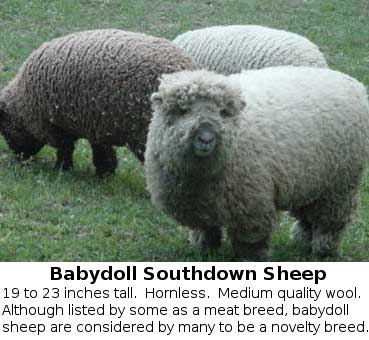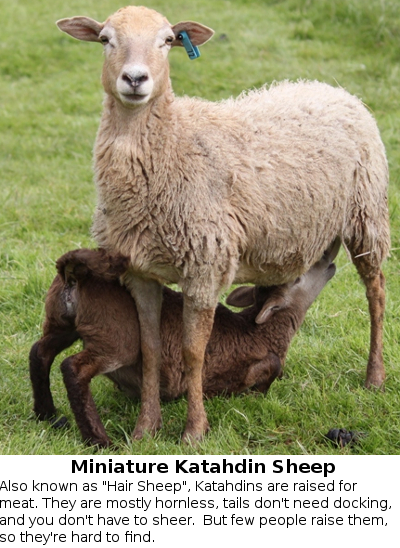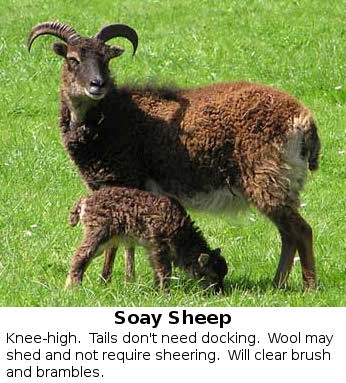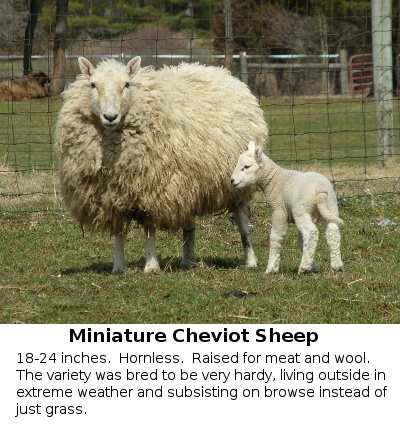
Or maybe miniature sheep?
 Your comments on my post
about Nigerian
dwarf goats were
extremely thought-provoking and helped us clarify our thinking.
Although the idea of goat milk is intriguing, I have to admit that the
real reasons I want to add an herbivore to the farm are (in order of
importance):
Your comments on my post
about Nigerian
dwarf goats were
extremely thought-provoking and helped us clarify our thinking.
Although the idea of goat milk is intriguing, I have to admit that the
real reasons I want to add an herbivore to the farm are (in order of
importance):
- Weed control --- We moved
all of our chickens from tractors to pastures last fall, which means a
lot of pastures to maintain. My observations suggest that the
optimal pasture for a chicken has a lot of tender herbaceous growth
close to the ground mixed in with trees and shrubs. However, what
our pastures want to turn into is thickets
of tall, herbaceous plants like ragweed, wingstem, virgin's bower,
and Japanese honeysuckle, all of which keep the tender growth out of
reach of chicken beaks. Yes, we can commit a few days a year to
weed whacking, but if we could get an animal to manage our pastures
while also producing useful products, how could we resist?
 Meat --- Eating
pastured meat seems to be one of the keys to keeping my moods and
weight more in balance, but it's so expensive (and hard to find enough
from growers
you trust.) Any little bit we grow ourselves would help.
Meat --- Eating
pastured meat seems to be one of the keys to keeping my moods and
weight more in balance, but it's so expensive (and hard to find enough
from growers
you trust.) Any little bit we grow ourselves would help.- Manure --- Although we'll lose half or more of the manure to the pasture, if we make sure the livestock sleep inside at night on deep bedding, we'll be able to harvest considerable biomass for the garden.
Which all sent me
thinking back toward the livestock Mark and I had first talked about
years ago --- sheep. The trouble with ordinary sheep is that they
require a lot of space, having equivalent food needs to about 50 chickens or a
fifth of a cow apiece. Then there's the fact that sheep are fans
of grass, which makes them much less helpful since they wouldn't eat
the big weeds I'm looking to take out. But then I learned about
miniature sheep.
 Miniature sheep are a bit
less than half the size of ordinary sheep, which means we could
potentially keep a ewe, a ram, and their lamb on about a fifth of an
acre in our wet climate. If you pick and choose your variety
wisely, you can even find miniature sheep that have been bred to forage
well on forbs (non-grassy herbaceous plants like the ones overrunning
our pastures.)
Miniature sheep are a bit
less than half the size of ordinary sheep, which means we could
potentially keep a ewe, a ram, and their lamb on about a fifth of an
acre in our wet climate. If you pick and choose your variety
wisely, you can even find miniature sheep that have been bred to forage
well on forbs (non-grassy herbaceous plants like the ones overrunning
our pastures.)
I've included photos of
the varieties I find most intriguing (skipping miniature sheep that are
raised primarily for wool.) I'm leery of the Babydoll Southdowns,
even though they're the easiest to find, because I can't turn up any
information on their ability to graze on rough pasture and the name
makes me think they've been bred primarily as pets. Soay sheep
are intriguing but there's very little data about using them as meat
goats.
Miniature Katahdins are
near the top of my list because all of our neighbors raise the
full-size version and "Hair Sheep" seem to do very well in our climate
and on rough pastures. On the other hand, a quick search of the
internet turns up no local sources of the miniature variety.
 My next favorite is the
Miniature Cheviot, which is reputed to have been bred to survive on
Scottish moors with no shelter or supplemental food. Although
still not very common, there are two breeders within a long day's drive
of us, which makes the breed at least feasible.
My next favorite is the
Miniature Cheviot, which is reputed to have been bred to survive on
Scottish moors with no shelter or supplemental food. Although
still not very common, there are two breeders within a long day's drive
of us, which makes the breed at least feasible.
So what do you think
about miniature sheep? Have any of you had first hand experience
with the breeds I mentioned? Any other forb-foraging, meaty,
miniature sheep I should look into instead? Or should we change
our sights yet again to a different type of herbivore entirely?
Want more in-depth information? Browse through our books.
Or explore more posts by date or by subject.
About us: Anna Hess and Mark Hamilton spent over a decade living self-sufficiently in the mountains of Virginia before moving north to start over from scratch in the foothills of Ohio. They've experimented with permaculture, no-till gardening, trailersteading, home-based microbusinesses and much more, writing about their adventures in both blogs and books.
Want to be notified when new comments are posted on this page? Click on the RSS button after you add a comment to subscribe to the comment feed, or simply check the box beside "email replies to me" while writing your comment.

If you've got enough pasture for sheep, why not just get a cow for beef? You can buy a yearling in the spring at around 600lb or so, pasture it until the fall when it weighs 1000lb and will yield 400+lb of freezer beef. Good eatin'. You'd need less than an acre of pasture - you don't have to worry about over-wintering.
BTW- don't your chickens eat more seeds & bugs than plants?
Sheila --- I think we're just not ready for a dairy animal yet. Maybe if we do well with the sheep, we can expand to dairy goats eventually! I figured that we wouldn't be too hard-pressed to get rid of the fleeces with the sheep, although chances are we'd give the wool away as gifts to knitting friends. You're totally right that parasites are a big problem with goats too.
You're totally right that parasites are a big problem with goats too.
Doc --- Cows tend to require better pasture than goats or sheeps, and even the smallest miniature cows need a lot more acreage and better fences. We're looking for something small that we can mix in with our existing chickens in their pastures to keep the big weeds down, and cows just don't fit that description.
It's very true that chickens prefer bugs, but they also like tender green growth, which seems to disappear fast when the big weeds shade the understory out. The bugs tend to move up into the new growth and out of reach too! We're experimenting with planting perennials in our pastures that will give the chickens more nutritious feed --- mulberries are a prime example --- but it takes years for perennials to produce much, so in the meantime we're stuck keeping the chicken-eye-level plants as productive as possible.
David --- The Katahdin (Hair) sheep and Soay are the only miniature sheep I've run across that don't require sheering. The former are just too rare for us to find --- the nearest breeder I was able to hunt out online is in Washington state! The Soay is a possibility, but they seem to be bred primarily for wool despite the fact that you don't sheer them (you pick it off in the spring), so I'm not sure whether their meat is worth it.
Seems to me that your saying you want goats but don't want to fuss with milking. So maybe sheep, but not wool. I'm not sure that there is any sheep that will clear brush like a goat. Goats actually prefer the stuff you are wanting removed. Also in my experience sheep are wanderers whereas goats seem to stay close. So if your pastures started to look bare in the winter you could let the goats out to roam around your compound.
Why not just get non-dairy goats. Around here these kind of goats are everywhere. Often times you can find people giving them away or for a low price. They got them to clear an area and now its done, or their kids raise them to show for 4-h in the fair. I think sheep are much more problematic.
Just wondering. Is there any concerns with sheep and their wool in a wet/humid environment with fungus or mold? Our high humidity used to make ours smell but I don't remember any other complications.
Erich --- Unfortunately, we're not interested in either full-size goats or full-size sheep, which reduces our options considerably. Both would require much more pasture than we'll have time to fence in anytime soon and would need much heftier fences if I want to keep them out of the garden. To the best of my knowledge, there are only four main types of miniature goats:
Nigerian dwarf goats (dairy)
Pygmy goats (dairy)
Miniature dairy goats (various hybrids between Nigerian dwarfs and standard milk goats)
Miniature fainting goats (pets)
Both goats and sheep seem to vary a lot by breed in respect to what they'll happily eat. We're considering the miniature cheviots because they'll eat "anything except thistles" (says the breeder I contacted with my questions.)
It's interesting to hear that you think of sheep as being more problematic than goats. I've ordered a sheep book because I honestly know very little about care of either! We'll see if reading the book scares me off four-footed livestock entirely.
I'm enjoying all the comments! So many thoughts and opinions. Just to give my final decision, I've been scared away from 4-leggeds for now... mostly because of the time commitment.
When I get around to it I hope to have multi-species grazing with 1-2 small cows and a few goats. I've read that the two graze well together, and you can rotate cows in after goats and your cows will actually consume and process goat parasites without getting ill-- they clean up the bugs! This is all just literature review, and hopefully in a year or two I will be able to test it against reality.
Seth's uncle had a goat dairy on this property over 30 years ago and the whole herd was killed by some type of bug. They were way overcrowded. Apparently the eggs/cysts would persist in the soil for 15+ years. It should be safe now, but that's why it's such a big concern for me.
Anna, I know you have a creek running through your property, so you should probably look for some information on "Liver Fluke". They can be a problem in damp areas (not just for sheep).
I don't know about the miniatures, but the full sized version of the Cheviot is also prone to foot-rot when kept in damp, lowland pastures; they're much more at home climbing hills (they originate, like me, in the borders). Despite being more like goats in that respect, they also have an annoying habit of falling over in odd places and then being unable to get up by themselves (there's a reason that the job of Shepherd still exists :-)). You'll definitely want to check your little flock a couple of times a day, just in case.
My daughter raised a sheep for 4H this year and we helped a neighbor with some nigerian dwarf goats and a few nubians (full-sized dairy goats). It was interesting to get acquainted with the different animals first hand and how they interact with each other and people. Here are a few things that I learned:
Both sheep and goats are social animals and will do much better if there are at least one other for it to be with. (Our lamb baad and baad constantly until we put it in a pen with some other sheep. A goat will do the same)
Both sheep and goats are quite strong and will test weak areas in any fence. They tend to stick together, but they will wander off in search of better grazing, if possible.
Dairy goats will only give milk if they have been freshened (given birth) in the past year or so. If you are not interested in the milk, you can either not breed them or let the kids drink the milk. (The mother's milk production will adjust to how much she is milked or the young will drink)
Not all goats and sheep eat the same type of foraging. You will want to research what type of natural forage you have available and what type that animal will eat. The childhood idea of a goat eating everything including cans isn't quite true, at least not for any of the goats that I have seen. They can still be quite picky. Like foraging chickens, sheep and goats also have their favorites.
Sheering sheep can be a lot of work, which is why it is fairly common to find professionals who travel to farms to sheer them. However, if you only have a couple animals, the cost may not be justified to bring them out. Buying your own equipment can be expensive, but after learning how to do it well, can pay for itself by doing this for other local sheep raisers.
Mature sheep are not generally used for meat, but lamb (less than a year) is quite popular. The market for goat meat is more common in different ethnic groups in the US. If you are raising an animal for meat, it makes a big difference in taste if you feed them a quality grain mix than just hay.
These were a few thoughts that came to mind. I hope that this helps in making an educated decision. My daughter sold her lamb at the county fair, so we are also thinking about what to do for the long run. We have about 25 chickens and a pair of angora rabbits, but we could use a pair of sheep or goats to keep the weeds down once we have a sturdy fence up. (We haven't decided yet)
John --- The parasite problem is one I'd heard of (but not read up on yet.) I'd heard that careful pasture rotation could deal with it, but I know I have a lot of research left to do.
It's good to hear that first hand information about Cheviots and foot rot. That doesn't sound good!
David --- This is just the kind of information that helps us so much with our decision-making! Thank you!
I'd been wondering about the dairy issue. I knew that if I let the kid stay on the mom full time, I wouldn't have to milk that year. What I wondered was whether that would make milking in later years more problematic. Hopefully someone can chime in and let me know if that's the case!